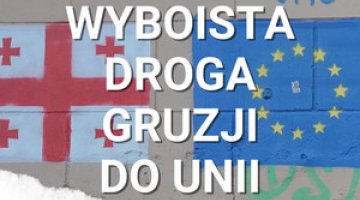Georgia: awaiting a turning point
On 16 November, Georgia’s Central Election Commission announced the official results of the parliamentary elections held three weeks earlier (see ‘The fourth term of Georgian Dream: a questionable victory‘), confirming the preliminary figures. Georgian Dream, the ruling party since 2012, secured 53.9% of the vote, translating into 89 seats in the 150-member parliament. Four pro-Western blocks also entered parliament: the centred on the Ahali party Coalition for Change (11%, 19 seats), the Unity coalition based on former President Mikheil Saakashvili’s United National Movement (10.2%, 16 seats), the Strong Georgia coalition (8.8%, 14 seats) and the For Georgia party (7.8%, 12 seats). The first session of the new parliament is scheduled for 25 November.
The opposition, claiming the election results were rigged, has intensified protests in an attempt to force the government to hold new elections under international supervision. The ruling party insists its victory is indisputable, though it is willing to consider minor policy adjustments. At present, a smooth transition into Georgian Dream’s fourth term in power (with eventual recognition by the Western community) is not yet guaranteed, though it remains the most likely outcome.
On the streets and in the courts
Following the announcement of the election results, which were rejected by both the opposition and President Salome Zourabichvili (whose term ends this year), protests intensified in Tbilisi. The post-election demonstrations were sporadic, somewhat chaotic, and disorganised, failing to attract enough protesters to force concessions from the government (the president initiated the first of these rallies; see ‘The post-election deadlock in Georgia‘). On the night of 17–18 November, for the first time, the demonstrators did not disperse but stayed overnight, blocking a major transport hub in the city centre. The protest was logistically well-prepared: food supplies, portable toilets, and tents were all provided. The leaders of the parties that entered parliament appeared together, acting in a coordinated manner. In the early hours of 19 November, security forces dispersed the demonstrators, but they reassembled in the evening, only to be dispersed again on the morning of 20 November.
The protests are expected to culminate on the day of the parliament’s inauguration. Opposition MPs have pledged to relinquish their seats, creating procedural difficulties as the chamber requires the presence of two-thirds of its members, or 100 deputies, to function normally.
In addition to street rallies, the opposition has pursued a legal battle. After courts of appeal rejected its electoral complaints (with first-instance courts annulling in several cases the results in a certain number of polling stations), the president, followed by opposition MPs, filed a lawsuit with the Constitutional Court seeking to annul the election results due to violations of ballot secrecy. The plaintiffs argued that the ballots were printed on excessively thin and translucent paper, making it possible to see who voted for which party, even when a ballot was inserted into the electronic vote counters (used at some polling stations) upside down; photographic evidence was submitted to support these claims. According to some Georgian constitutional experts, the first session of the new parliament can be legally convened only after these lawsuits are resolved.
Through Western eyes
The European Union, which Georgia seeks to join, has responded to the election results with a dual approach. At the EU foreign ministers’ meeting on 18 November, Hungary and Slovakia reportedly opposed the imposition of sanctions, while Germany rejected the idea of suspending visa-free travel with Georgia. On the one hand, the EU decided to redirect €100 million, initially intended to support Georgian government programmes, to local NGOs and media outlets. On the other, according to Josep Borrell, Vice-President of the European Commission, it agreed to send a ‘technical mission’ to Georgia to assess the situation on the ground.
It remains unclear when and under what conditions the EU’s ‘technical mission’ will arrive in Georgia and to what extent the local government will cooperate with it. Tbilisi Mayor Kakha Kaladze has expressed full openness to cooperation, but Mamuka Mdinaradze, secretary-general of Georgian Dream, has stated that the mission’s format is vague and needs to be clarified.
Possible outcomes
In the most likely scenario, Georgian Dream will remain in power, resulting in both the party and Georgia drifting closer to Russia, despite the fact that Georgian Dream has softened its anti-Western rhetoric since the elections. This outcome would require Brussels to decide whether to maintain Georgia’s status as an EU candidate country and, if so, under what conditions.
A far less probable scenario sees the opposition succeed in forcing the government to call new elections, as advocated by President Zourabichvili. However, even in that case, an opposition victory would be unlikely as all polls indicate that Georgian Dream remains the most popular political force in the country.



